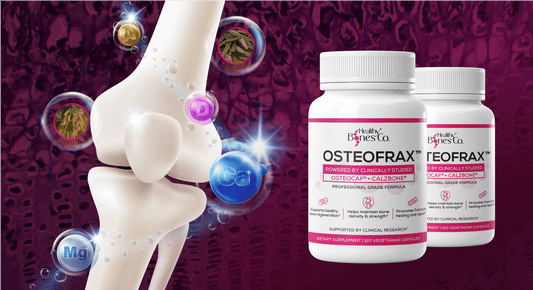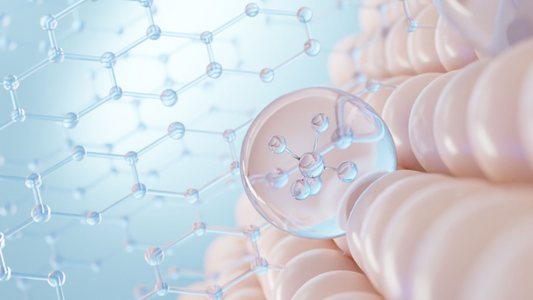We’ve all heard the classic advice for keeping bones strong: exercise regularly, take your calcium and vitamin D, and maybe even add a collagen supplement to your routine.
But when it comes to truly fortifying your bones and preventing fractures as you age, there’s one key nutrient that’s often overlooked: vitamin K2.
Vitamin K2 helps direct calcium to bones, enhance bone quality, and lower your risk of fractures.
However, there’s a catch: not all forms of vitamin K2 are equally effective.
In fact, one form that’s known for its impressive bone-strengthening properties may struggle to get absorbed by the body, so your bones might not be getting the full support they need.
So, how can you make sure you’re getting the most out of vitamin K2 to help strengthen your bones and protect against fractures?
In this article, we’ll explore the powerful benefits of vitamin K2 for bone health, discuss the different forms available, and provide practical tips on how to boost its efficacy for strong and resilient bones as you age.
What is Vitamin K2?

Vitamin K2, also known as menaquinone, is a fat-soluble vitamin that supports important bodily functions, especially by promoting bone and cardiovascular health. (1)
Unlike vitamin K1 (phylloquinone), which is primarily found in leafy green vegetables, vitamin K2 is commonly found in fermented foods and animal products.
However, while both vitamins help in blood clotting, they each have distinct functions and serve different purposes in the body.
For example, vitamin K1 is primarily responsible for blood coagulation, which is essential for the synthesis of prothrombin, a protein crucial for blood clotting. Without adequate vitamin K1, the body cannot effectively stop bleeding from injuries. (2)
On the other hand, while vitamin K2 plays a minor role in coagulation, it primarily supports bone health by optimizing calcium utilization, regulating bone remodeling, and working synergistically with vitamin D3 to strengthen bones.
Vitamin K2 and Calcium Utilization

Vitamin K2 ensures your body uses calcium effectively, building strong and healthy bones. (3)
It works by activating the protein osteocalcin, which helps bind calcium ions and deposit them directly into the bone structure.
The result? Stronger bones with a higher resistance to fractures.
In fact, maintaining adequate levels of vitamin K2 increases the amount of active gamma-carboxylated osteocalcin in the bloodstream, which has been associated with better bone mineral density (BMD), making your bones more resilient and less prone to injury. (4)
A study published in the Journal of Bone and Mineral Metabolism revealed that vitamin K2 supplementation in postmenopausal women with porous bones led to a 26.52% increase in total osteocalcin (OC), a key marker of new bone formation. (5)
The research analyzed data from nine randomized controlled trials (RCTs) involving 6,853 participants.
The results revealed a 2.17% improvement in lumbar spine bone mineral density (BMD) and a 1.57% increase in forearm BMD.
Levels of undercarboxylated osteocalcin (uc-OC), a marker of poor bone health, also decreased by 0.9 ng/mL, suggesting improved bone quality.
Meanwhile, total osteocalcin (OC), a marker of new bone formation, increased by an impressive 26.52%.
In other words, supplementing with vitamin K2 can help support healthy bone mineral density and reduce fracture risk in postmenopausal women with bone loss as they age.
Moreover, by directing calcium to the bones rather than the arteries, vitamin K2 serves a dual role, promoting both skeletal and heart health.
Regulation of Bone Remodeling

Vitamin K2 influences bone remodeling by regulating the balance between osteoblasts (bone-forming cells) and osteoclasts (bone-resorbing cells). (6)
It works by suppressing the expression of receptor activators of nuclear factor kappa B ligand (RANKL), which promotes osteoclast formation. Simultaneously, it increases the expression of osteoprotegerin (OPG), a protein that inhibits osteoclastogenesis.
This dual action helps create an ideal environment for bone formation while reducing bone breakdown, supporting stronger bones, and lowering fracture risk.
This was confirmed by a study using human osteoblast-like cells published in the Journal of Bone and Mineral Research, where researchers found that vitamin K2 enhances osteocalcin production and activation, improving bone mineralization and overall bone strength. (7)
In the study, researchers treated human bone cells (osteoblasts) with 1.25-dihydroxyvitamin D3, a potent form of vitamin D, for 20 days to boost osteocalcin production.
The results revealed that adding vitamin K2 not only increased osteocalcin accumulation in the bone matrix but also reduced its presence in the surrounding medium.
Moreover, the longer the treatment, the greater the osteocalcin levels, indicating enhanced bone mineralization, as osteocalcin binds with hydroxyapatite, a critical mineral in bones.
However, when warfarin, a blood thinner that interferes with vitamin K activity, was introduced, these beneficial effects were blocked.
As a result, both osteocalcin buildup and bone mineralization decreased, which can impair bone remodeling, weaken your bones, and increase your risks of falls and fractures.
This shows that vitamin K2 not only helps maintain bone mineral density but also improves important bone health markers, helping strengthen your bones as you age.
Synergy with Vitamin D3

Vitamin K2 and vitamin D3 work together to optimize calcium absorption and ensure it’s used effectively to build and maintain strong, healthy bones. (8)
Vitamin D3 helps boost calcium absorption from the intestines into the bloodstream. Without sufficient vitamin D, the body absorbs only 10-15% of dietary calcium; with adequate levels, absorption increases to 30-40%. (9)
Vitamin K2, on the other hand, ensures that the calcium is properly directed to the bones where it’s needed most. (10)
Without enough vitamin K2, calcium can otherwise be deposited in soft tissues or arteries, leading to harmful buildup. This can increase blood pressure and reduce blood flow, negatively impacting your heart health.
Together, these vitamins help maintain strong bones, prevent calcium buildup in the arteries, and promote skeletal health.
A study published in Maturitas showed that combining vitamin D3 and vitamin K2 can support bone mineral density (BMD) in postmenopausal women with low bone density. (11)
The study involved 172 women who were divided into four groups: vitamin K2 therapy, vitamin D3 therapy, combined vitamin K2 and D3 therapy, and a control group receiving only dietary guidance.
Over two years, the researchers tracked their BMD and analyzed several bone health markers, including serum type 1 collagen and osteocalcin, while monitoring blood clotting factors to ensure safety.
The results were clear: the group that received both vitamin K2 and D3 experienced a 4.92% improvement in bone mineral density (BMD), while the group taking only vitamin K2 had a modest increase of just 0.135%.
This suggests that the combination of these vitamins was far more effective in improving bone density.
The study also revealed that this combination supported overall bone turnover, promoting both bone formation and resorption.
While there was a slight, clinically insignificant increase in blood clotting activity, it remained within healthy levels, showing no risk of harmful clotting.
In short, the synergy of vitamins K2 and D3 not only strengthens bones but also supports cardiovascular health by guiding calcium to the right places and preventing harmful buildup in soft tissue.
MK-4 vs MK-7

Vitamin K2 exists in two primary forms: MK-4 and MK-7. Both forms help in blood coagulation, but they differ in their sources, absorption, and impact on bone and cardiovascular health.
Knowing these differences can help you choose the right form of vitamin K2 to best support your stronger bone goals.
Sources
MK-4 is primarily found in animal-based foods, including organ meats such as liver, as well as in egg yolks and dairy products. Additionally, limited amounts of MK-4 can be synthesized in the body from vitamin K1, which is found in green leafy vegetables. (12)
In contrast, MK-7 is predominantly present in fermented foods, with natto (fermented soybeans) being the richest source. It can also be found in certain cheeses and other fermented dairy products. (13)
Half-Life
MK-7 has a longer half-life, remaining active in the bloodstream for up to 72 hours or more. This extended duration means that MK-7 can have prolonged effects on calcium metabolism and bone health, often requiring less frequent dosing. (14)
MK-4, on the other hand, has a shorter half-life, lasting only 1 to 2 hours. Because it is cleared from the body more rapidly, MK-4 needs to be taken more frequently to maintain its presence in the bloodstream.

Bioavailability and Effects on Bone Health
MK-7 is known for its high bioavailability due to its longer half-life, which allows it to stay in the bloodstream longer, potentially enhancing the activation of vitamin K-dependent proteins such as osteocalcin. (15)
On the other hand, MK-4, although it has low bioavailability, is considered highly effective for bone health. Despite its shorter half-life, MK-4 is particularly effective at activating osteocalcin, a protein crucial for binding calcium to the bone matrix.
This process directly impacts calcium utilization and strengthens bones.
In fact, a study published in the Journal of Bone and Mineral Metabolism found that a daily dose of MK-4 supported healthy bone quality and reduced fracture risk in postmenopausal Japanese women. (16)
Researchers worked with 48 postmenopausal Japanese women aged 50-65 who were randomly assigned to either a placebo group or the MK-4 group for 12 months.
The results showed that MK-4 supplementation helped reduce serum undercarboxylated osteocalcin (ucOC) and pentosidine concentrations, which are markers of bone turnover and bone quality.
The MK-4 group also maintained stable bone mineral density (BMD), while the control group experienced a decrease in BMD over the 12 months.
These findings suggest that daily MK-4 supplementation can support healthy bone quality and reduce fracture risk in postmenopausal women without significant side effects.
How to Boost Vitamin K2 in the Body
To support strong, healthy bones and effectively reduce the risk of fractures, it's important to adopt healthy lifestyle habits that boost your vitamin K2 intake.
Eat a Diet Rich in Vitamin K2

For stronger bones, start by loading up on nutrient-dense animal-based foods like beef liver, grass-fed ghee or butter, dark meat chicken, pastured egg yolks, and emu oil. These are excellent sources of MK4, a form of vitamin K2 that helps direct calcium to the bones and teeth rather than soft tissue.
Additionally, add fermented foods to your diet for a natural source of MK7. Hard cheeses, sauerkraut, kimchi, and natto are packed with MK7, which is produced through bacterial fermentation—a process that also occurs to some extent in the gut, depending on a healthy microbiome.
By combining these foods, you can naturally boost your vitamin K2 levels, enhancing bone strength and reducing fracture risk, especially as you age.
Supplement with Vitamin K2

Getting enough vitamin K2 from your diet is a great start, but for many people—particularly those taking calcium supplements—it may not be sufficient to meet the body’s full needs.
To better support your bone health, consider supplementing with both forms of vitamin K2: MK-4 and MK-7.
While there isn’t an official recommended daily allowance (RDA) for vitamin K2, research points to effective dosages for optimizing bone health. For MK-7, a dosage of 90-200 mcg is ideal, while MK-4 ranges from 10-45 mg.
You may need to adjust the dosage to suit your personal needs, but these guidelines offer a solid foundation for improving bone mineralization and lowering the risk of fractures.
Enhance MK-4 Utilization with Geranylgeraniol (GG)

Apart from supplementing with vitamin K2, particularly MK-4, it’s important to ensure that the MK-4 is effectively absorbed and utilized by your bones—not just excreted through urine.
To maximize the benefits of MK-4 for bone health, consider supplementing with geranylgeraniol (GG)—a powerful compound that boosts the effectiveness and bioavailability of vitamin K2, particularly menaquinone-4 (MK-4). (17)
GG supports the body’s natural production of MK-4, acting as a precursor in its biosynthesis. (18)
By helping convert dietary vitamin K1 and other intermediates into MK-4, GG ensures there are sufficient levels of this nutrient available to activate the vitamin K-dependent proteins essential for bone health.
This process is crucial because MK-4 is only found in limited quantities in most diets, and adequate levels are necessary for optimal bone mineralization and density.
In addition to supporting MK-4 production, GG also increases its bioavailability.
When supplemented, GG generates geranylgeranyl pyrophosphate (GGPP), which is necessary for the prenylation of proteins involved in bone metabolism. (19)
This enhanced bioavailability allows for more effective use of MK-4 in the body, improving the activation of osteocalcin—a protein that helps bind calcium to bones, ultimately strengthening bone structure.
GG and MK-4 also work together to inhibit osteoclast formation through different pathways.
MK-4 inhibits the production of prostaglandin E2 (PGE2) by blocking cyclooxygenase-2 (COX-2), while GG downregulates RANKL (receptor activator of nuclear factor kappa B ligand), a key regulator of osteoclast differentiation. (20)(21)
This dual action promotes bone formation while reducing bone resorption, leading to stronger bones and lower fracture risk.
Beyond its effects on osteoclasts, GG also supports osteoblast function—the cells responsible for creating new bone. (22)
Elevated MK-4 levels boost osteoblast activity and promote the synthesis of bone matrix proteins like osteocalcin. Together, GG and MK-4 help optimize bone health by improving bone formation and mineralization.
In summary, GG helps boost the benefits of MK-4 by supporting its natural production, increasing its bioavailability, and delivering synergistic effects that promote bone health.
However, as we age or take medications like statins and bisphosphonates, our levels of geranylgeraniol (GG) can decline.
This drop can interfere with the body’s ability to produce adequate amounts of MK-4, which we already know supports healthy and resilient bones.
To help with the natural synthesis of MK-4 and promote both bone health and cardiovascular function, it's important to maintain sufficient GG intake.
Fortunately, Healthy Bones Co. Annatrol™ Bone Support contains 300 mg of geranylgeraniol (GG) to help boost the absorption and effectiveness of vitamin K2, particularly MK-4.
By replenishing natural levels, GG can protect from age-related physical decline, support bone strength, and reduce muscle fatigue—helping you maintain better overall mobility and vitality as you age.
In addition, Healthy Bones Co.'s Annatrol™ Bone Support is formulated with 300 mg of premium pure tocotrienols.
Tocotrienols, a potent form of vitamin E, help neutralize free radicals and shield cells from oxidative damage. (23)
By combating oxidative stress—often linked to aging—tocotrienols protect bone tissue, supporting stronger, healthier bones as you age.
This is backed by research published in BMC Complementary Medicine and Therapies. (24)
In a 12-week study involving 87 postmenopausal women, it was found that those who received DeltaGold® annatto tocotrienol at dosages of 300 and 600 mg daily experienced decreased bone resorption and improved bone formation.
The participants also showed a nearly 100% increase in the BALP/NTX ratio, a measure of bone remodeling, after 12 weeks, along with a reduction of 13-24% in the RANKL/OPG ratio, indicating decreased bone resorption compared to significant increases in the placebo group.
This suggests that these women were able to strengthen their bone health, even during postmenopause when their estrogen levels were at an all-time low, thanks to tocotrienol.
However, beyond the bone health benefits, just two pea-sized capsules of Annatrol™ Bone Support can also…
- Help maintain skin and eye health*
- Promote cardiovascular and circulatory health*
- Promote regulation of healthy metabolic functions*
- Support insulin sensitivity and normal glycemic control*
- Promote a healthy inflammatory response*
- Support antioxidant status*
- Maintain healthy liver function*
- Help mitochondrial function and cellular energy generation*
- Support hormone synthesis*
- Support proper cell membrane construction*
- Provide support for healthy lipid profile and total cholesterol levels*
Maximize vitamin K2 absorption, especially MK-4, to promote strong, resilient bones as you age.





